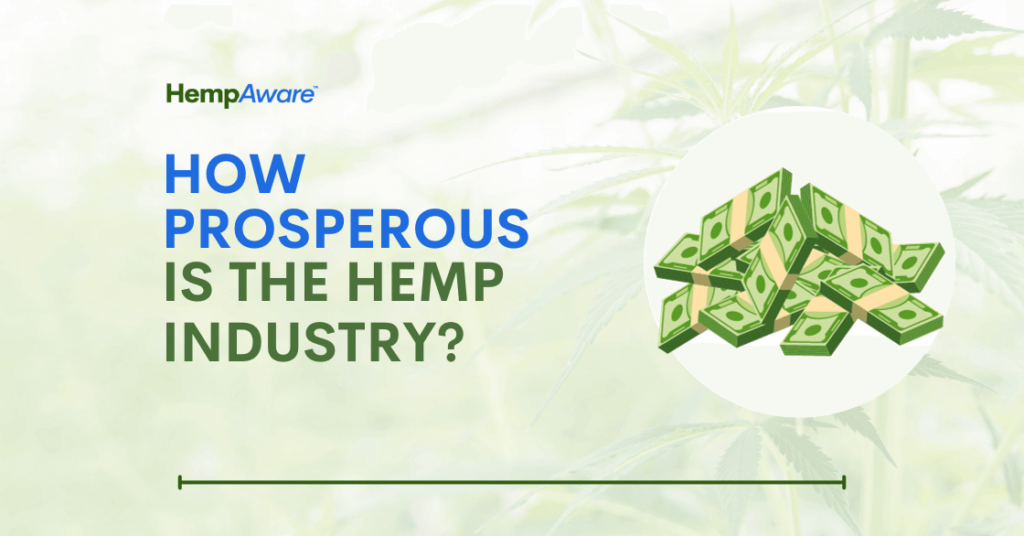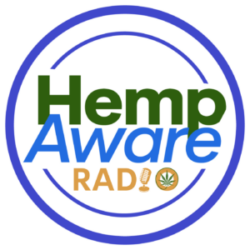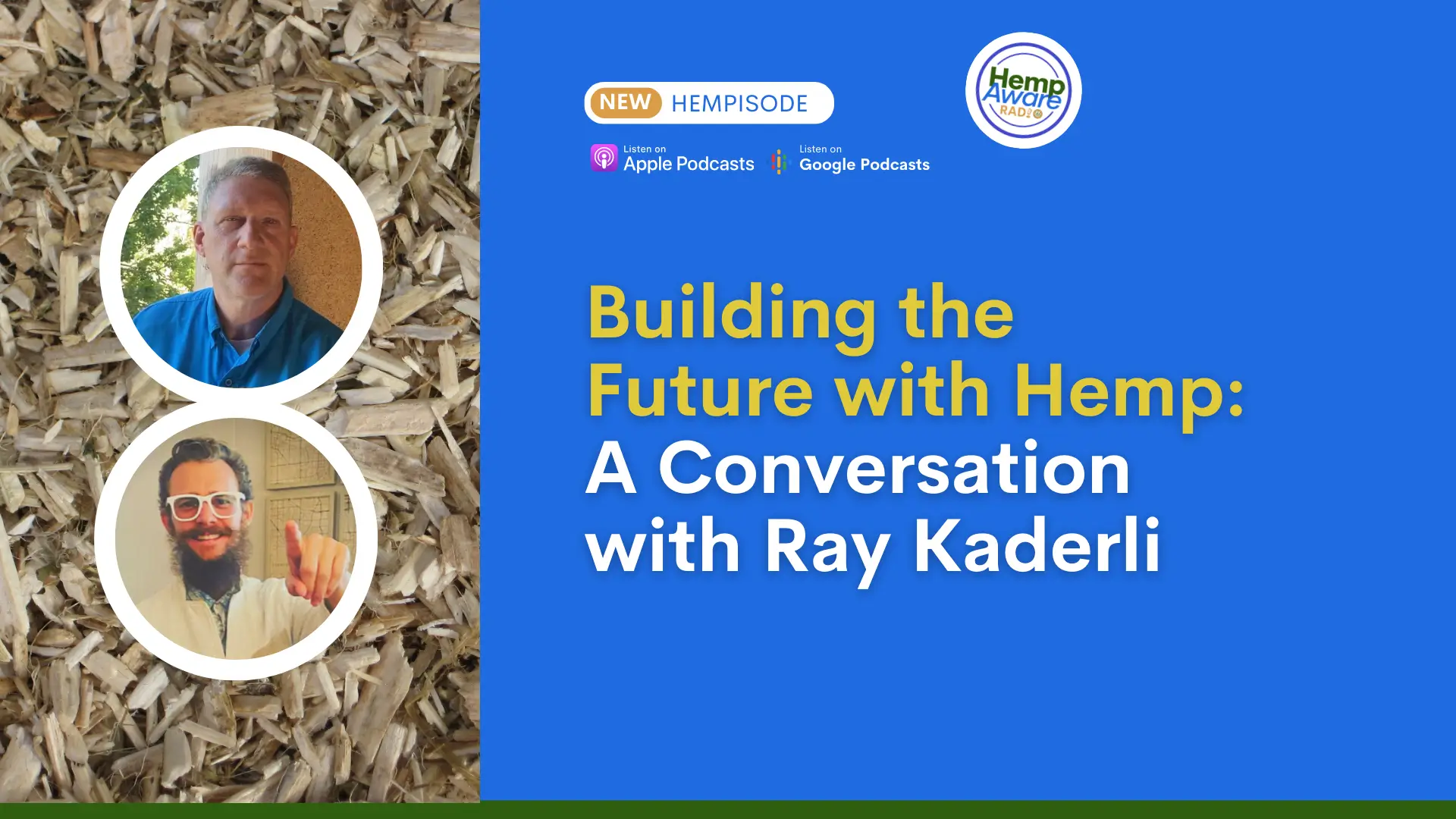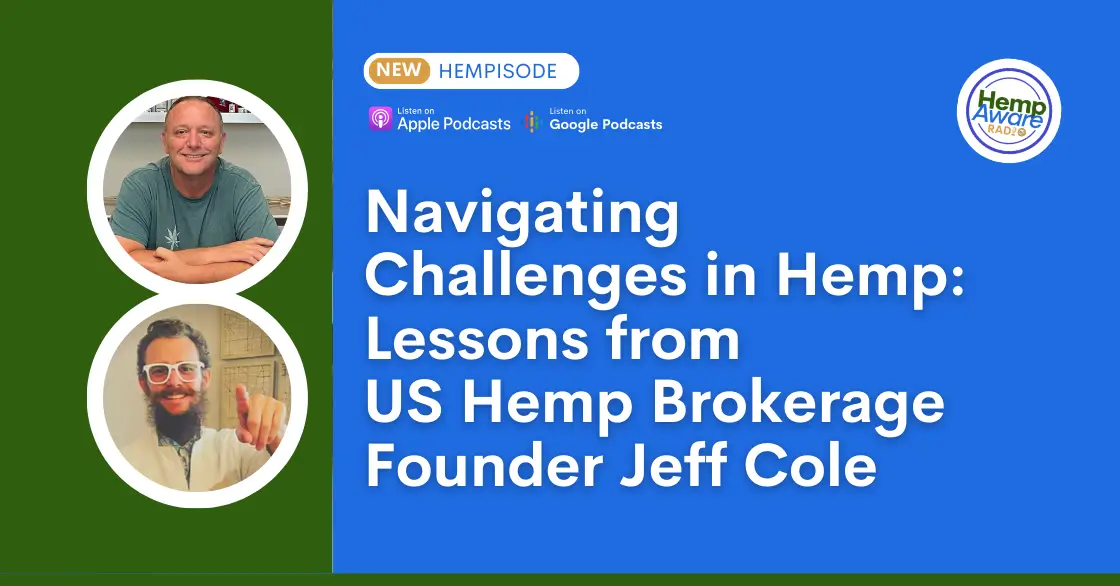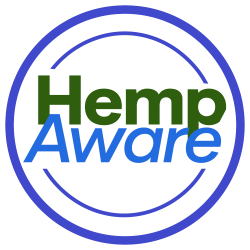With the HempAware Radio Podcast, we are dedicated to spreading awareness and knowledge about the hemp industry. And in this hempisode, I interview long-time expert and good friend of mine Lawrence Serbin with one of the original hemp companies: Hemp Traders.
This post is a summarization of some of the content we cover in this podcast.
Unlike marijuana or cannabis, hemp is not a drug.
It is important to understand that cannabis grown for medical or recreational purposes is bred differently, with high THC levels, while industrial hemp is cultivated for various industrial uses.
In this post, we will explore the reasons behind hemp’s legality, the thriving hemp industry, and the endless possibilities it offers, demonstrating it’s lucrative nature and prosperous potential.
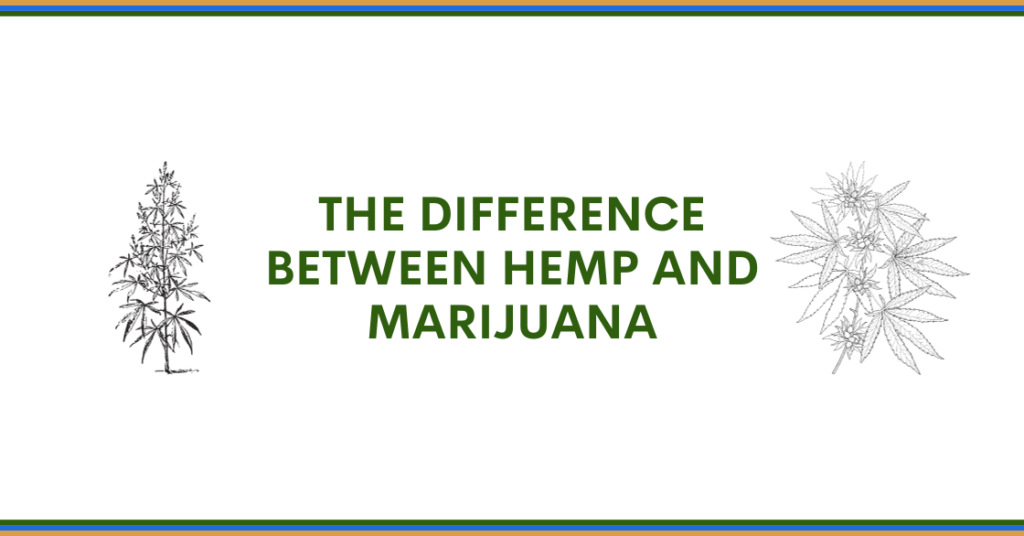
The Difference Between Hemp and Marijuana
Hemp and marijuana are often confused due to their similar appearance, but they have distinct differences.
While marijuana is bred for its psychoactive properties, hemp is cultivated for its industrial uses.
Hemp contains minimal THC, the compound responsible for the ‘high’ associated with marijuana, making it non-intoxicating and safe for various applications.
When it comes to the cannabis plant, there are two primary varieties: hemp and marijuana.
Despite belonging to the same species, Cannabis sativa, these two plants have different genetic profiles, appearances, and uses.
Genetic Differences Between Hemp and Marijuana
One of the main factors that distinguish hemp from marijuana is their genetic makeup.
Hemp is typically defined as cannabis plants with less than 0.3% THC content, while marijuana contains higher levels of THC. THC, or tetrahydrocannabinol, is the psychoactive compound responsible for the intoxicating effects associated with marijuana.
Due to its low THC content, hemp does not produce the euphoric ‘high’ that marijuana does.
Instead, it is cultivated for its various industrial purposes, such as fiber production, biofuel, paper, textiles, and building materials.
Appearance of Hemp vs Medical Cannabis
Hemp and marijuana plants may look similar at first glance, but there are subtle differences in their physical characteristics.
Hemp plants tend to be grown taller and skinnier with narrow leaves concentrated towards the top of the plant.
On the other hand, marijuana plants are shorter, bushier, and have broader leaves.
These physical differences are a result of the breeding and cultivation practices employed for each plant. Marijuana strains are bred to maximize THC content, while hemp strains prioritize fiber and seed production.
Although with the discovery and popularization of CBD – hemp can now be grown just like other forms of cannabis, but still contain below the legal limit of 0.3% THC.
Uses for Hemp and Cannabis
One of the primary distinctions between hemp and marijuana is their intended uses.
Marijuana is primarily used for medicinal, therapeutic or recreational purposes due to its psychoactive properties.
It is commonly consumed by smoking, vaporizing, or ingesting in the form of edibles or extracts, and also as topical products.
On the other hand, hemp is cultivated for its industrial and health applications. The versatility of hemp makes it a valuable crop for numerous industries.
Hemp fibers can be used to produce textiles, ropes, and paper.
The seeds can be processed for oil, snacks, or used in animal feed.
Additionally, hemp biomass can be used for biofuel production.
Furthermore, hemp-derived CBD (cannabidiol) has gained popularity for its potential therapeutic benefits.
Unlike THC, CBD does not produce a psychoactive effect, and it is commonly used for its purported anti-inflammatory, analgesic, and calming properties.
The Legal Perspective on Hemp & Cannabis
Due to the variations in THC content, hemp and marijuana have different legal statuses in many jurisdictions.
In the United States, for example, hemp containing less than 0.3% THC was federally legalized with the passage of the 2018 Farm Bill. (Although at the time of this podcast this law was not enacted yet)
Marijuana, on the other hand, remains classified as a Schedule I substance, which makes it illegal at the federal level.
These legal distinctions have led to the development of separate regulations for both hemp and marijuana cultivation, manufacturing, and distribution.
It’s important to note that laws regarding cannabis can vary by country and state, so it’s essential to stay informed about the specific regulations in your area.
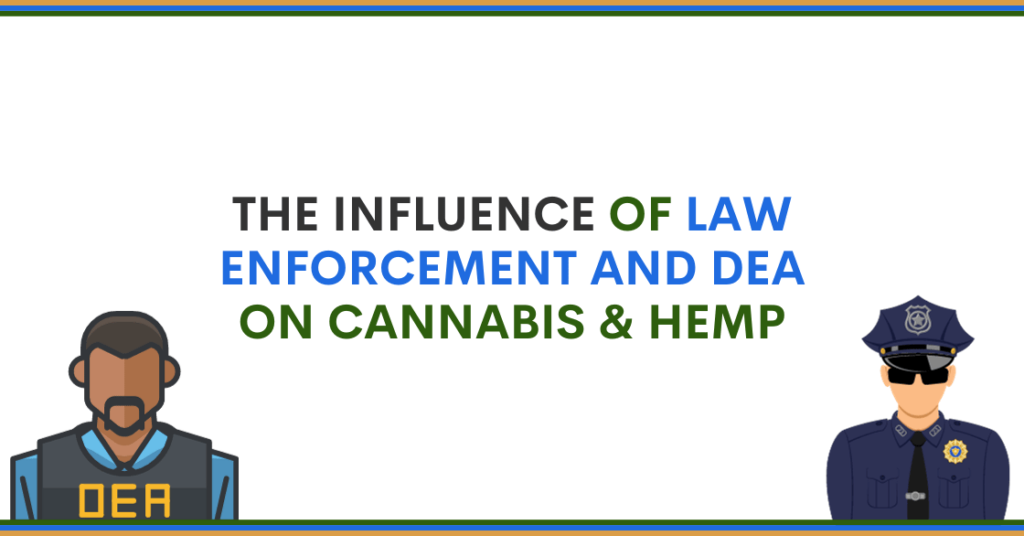
The Influence of Law Enforcement and DEA on Cannabis & Hemp
When it comes to the controversial status of hemp and its illegal nature, Lawrence (Larry) Serbin, a prominent figure in the hemp industry for two decades, raises important points about the influence of law enforcement and the Drug Enforcement Administration (DEA).
Serbin firmly believes that these entities play a significant role in maintaining the illegal status of hemp, despite the lack of evidence against it.
In his view, this opposition to hemp legalization is driven by self-interest and the desire to protect their own jobs.
Law enforcement agencies and the DEA have long been at the forefront of the war on drugs, and cannabis, including hemp, has been a primary target of their efforts.
For years, they have fought against the legalization of cannabis, which includes hemp, even though hemp does not possess the psychoactive properties of marijuana.
The argument that law enforcement officials and the DEA use to justify this opposition is that hemp cultivation could provide cover for marijuana growers and make it difficult for them to enforce drug laws.
However, there is a lack of concrete evidence to support this claim.
Not to mention, any ganja grower is not going to want hemp to be grown anywhere near their crops, as the cross pollination can destroy the potency of their plants.
In fact, studies have shown that hemp cultivation can actually help law enforcement in distinguishing between hemp and marijuana plants due to their different physical characteristics.
Hemp plants tend to be taller and skinnier, while marijuana plants are shorter and bushier with more leaves, in general.
These differences make it relatively easy to differentiate the two, dismissing the argument that hemp legalization would hinder law enforcement efforts.
Now of course hemp can be feminized just like any cannabis seeds, and there for can look like cannabis, but the THC levels will still be below the threshold.
Despite this lack of evidence against hemp and its potential benefits, law enforcement agencies and the DEA continue to resist its legalization.
Larry argues that this resistance is driven by self-interest.
The war on drugs has provided law enforcement agencies and the DEA with substantial funding and resources, and the illegal status of hemp plays a role in maintaining this status quo.
By opposing the legalization of hemp, law enforcement agencies and the DEA can justify their budgets and keep their jobs secure.
The fear of losing funding and resources pushes them to maintain the illegality of hemp, even though it could potentially provide numerous economic and environmental benefits.
By perpetuating the stigma around hemp, they can continue to wage their war on drugs and receive the necessary support from the government and society.
However, it is important to recognize that times are changing.
As more research is conducted and the public’s perception of cannabis evolves, the push for hemp legalization is gaining momentum.
Numerous states have already legalized the cultivation of hemp for industrial purposes, recognizing its potential as a versatile crop that can be used in various industries, including textiles, construction, and biofuel.
Despite the opposition from law enforcement agencies and the DEA, the legalization of hemp is increasingly viewed as a common-sense move that can benefit the economy, create jobs, and contribute to sustainability efforts.
Larry’s perspective sheds light on the influence of these entities and their resistance to change.
As society becomes more educated about the potential of hemp and its positive impact, it is likely that the influence of law enforcement and the DEA will diminish, paving the way for a future where hemp is no longer unjustly stigmatized.
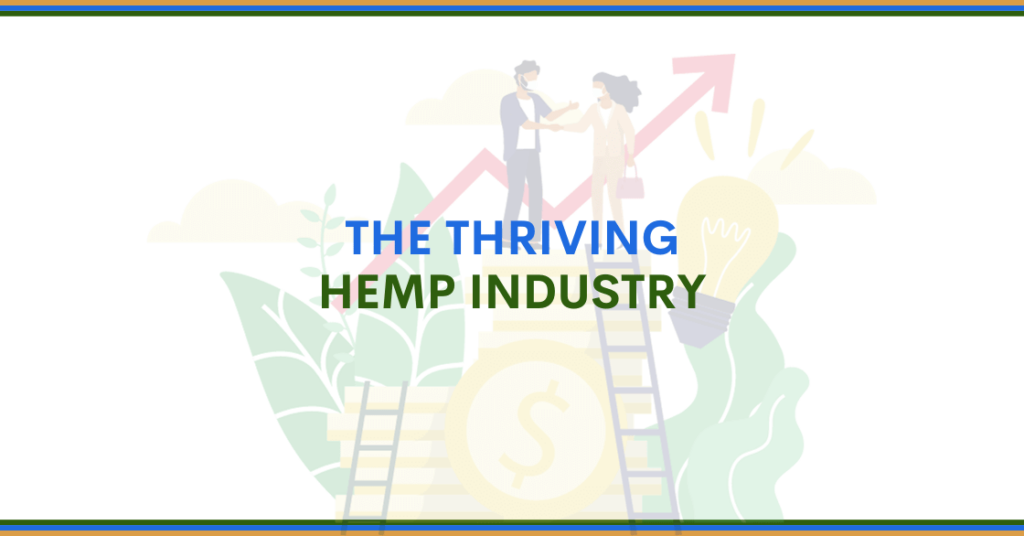
The Thriving Hemp Industry
According to the Hemp Industries Association, the hemp industry in the United States alone is valued at over $450 million.
This figure highlights the growing demand for hemp-based products and the potential economic benefits associated with its legalization.
Many industrialized nations, including Canada, France, England, Germany, Spain, and Australia, have already embraced hemp cultivation.
Hemp, scientifically known as Cannabis sativa, is a versatile plant that has been cultivated for thousands of years. Traditionally, it has been primarily associated with its psychoactive counterpart, marijuana.
However, hemp differs from marijuana in that it contains very low levels of tetrahydrocannabinol (THC), the compound responsible for the psychoactive effects of marijuana.
Instead, hemp is rich in cannabidiol (CBD) and has a wide range of industrial and medicinal uses.
One of the main reasons for the thriving hemp industry is the increasing awareness of the health benefits of CBD.
CBD has been shown to have anti-inflammatory, analgesic, and neuroprotective properties.
It is commonly used to alleviate symptoms of various conditions, including chronic pain, anxiety, epilepsy, and insomnia.
Furthermore, the legalization of hemp cultivation has paved the way for the development of a wide range of hemp-based products.
These products include CBD oils, tinctures, capsules, topicals, edibles, and even pet treats.
The market for these products has been rapidly expanding, driven by the growing popularity of CBD and consumer demand for natural alternatives to pharmaceutical medications.
The economic benefits of the hemp industry extend beyond the production of CBD products. Hemp is also used in various industries, including textiles, construction, paper, food, and even biofuel production.
The plant fibers are incredibly strong and durable, making them suitable for manufacturing clothing, accessories, and even car parts.
Hemp seeds are rich in essential fatty acids and protein, making them a valuable ingredient in health foods and supplements.
The plant itself is highly sustainable, requiring minimal water, pesticides, and fertilizers for cultivation.
Many industrialized nations have recognized the potential of the hemp industry and have embraced hemp cultivation.
Canada, for example, has been at the forefront of hemp production, with a well-established regulatory framework and a thriving market for hemp-based products.
France, England, Germany, Spain, and Australia have also made significant investments in hemp cultivation and research.
The legalization and widespread acceptance of hemp have opened up countless opportunities for farmers, entrepreneurs, and consumers.
It has created a booming industry that not only provides economic benefits but also promotes sustainable and environmentally friendly practices.
As the demand for hemp-based products continues to grow, it is expected that the industry will continue to thrive and expand.
In conclusion, the hemp industry in the United States and other industrialized nations is experiencing significant growth and economic potential.
The increasing demand for hemp-based products and the recognition of its numerous benefits have contributed to the thriving industry.
With the legalization of hemp cultivation and the development of a wide range of hemp-based products, the industry is expected to continue its upward trend.
It presents an opportunity for farmers, entrepreneurs, and consumers to embrace a sustainable and profitable industry.
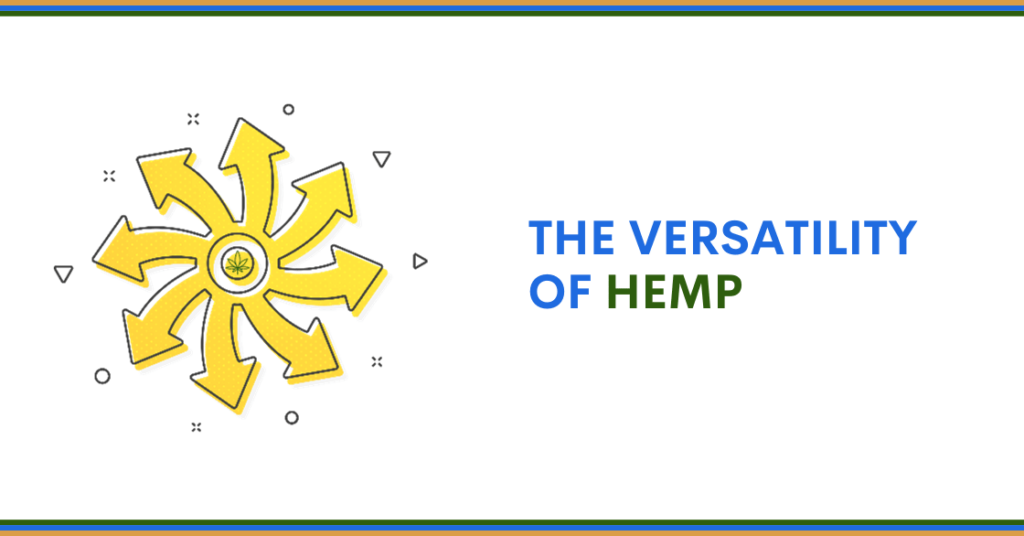
The Versatility of Hemp
Hemp’s versatility is one of its greatest strengths. It can be used in various fabric finishing processes, such as dying, softening, and printing.
Additionally, the possibilities for creating products with hemp are virtually endless.
From textiles and construction materials to food and skincare products, hemp offers a sustainable and eco-friendly alternative.
When it comes to fabric finishing, hemp is a game-changer. Its fibers can be dyed with ease, resulting in vibrant and long-lasting colors.
Whether it’s clothing, bedding, or upholstery, hemp fabrics can add a touch of natural beauty and durability to any product.
Hemp Fabric Benefits
Moreover, hemp fabric softens with every wash, becoming even more comfortable over time.
Its natural texture and breathability make it a popular choice for clothing, especially in warmer climates.
Printing on hemp fabric is also a breeze. The fabric readily absorbs ink, creating sharp and vibrant designs.
Whether it’s intricate patterns or simple logos, hemp fabric serves as an excellent canvas for expression. This quality makes it a favorite among designers and artists who value both sustainability and creativity.
But hemp’s versatility doesn’t stop at fabric finishing. It is a true unsung hero of sustainable innovation.
Hemp can be used to make a wide array of products, ranging from building materials to beauty essentials.
When it comes to construction, hemp offers a renewable and biodegradable alternative.
Benefits of Hempcrete
Hempcrete, a mixture of hemp fibers, lime, and water, can be used as an eco-friendly substitute for concrete.
It provides excellent insulation, helping to regulate temperature and reduce energy consumption.
From walls to flooring, hemp-based construction materials are becoming increasingly popular for their sustainability and durability.
Hemp Food Benefits & Lifestyle Goods
In the world of consumer goods, hemp has also found its place.
Food products made from hemp seeds have gained popularity due to their nutritional value and versatility.
Hemp seeds are a rich source of protein, healthy fats, and essential vitamins and minerals.
They can be used in a variety of recipes, from smoothies and salads to baked goods and snacks.
Skincare products infused with hemp extract have also been trending in recent years.
Hemp oil is known for its moisturizing, anti-inflammatory, and antioxidant properties.
It can help nourish and protect the skin, making it a popular ingredient in lotions, balms, and creams.
Many people also claim that hemp oil can help alleviate skin conditions such as dryness, eczema, and acne.
What makes hemp even more remarkable is its eco-friendly nature.
It is a highly sustainable crop that requires minimal water, pesticides, and fertilizers to grow.
Hemp plants also help improve soil health by removing toxins and preventing erosion.
Furthermore, hemp is a fast-growing plant that can be harvested in a relatively short period, making it an ideal renewable resource.
In conclusion, the versatility of hemp is truly remarkable.
From its use in fabric finishing processes to its ability to create a wide range of products, hemp offers an eco-friendly and sustainable alternative.
Whether it’s clothing, construction materials, food, or skincare, the possibilities with hemp are virtually endless.
By incorporating hemp into our everyday lives, we can contribute to a greener and more sustainable future.
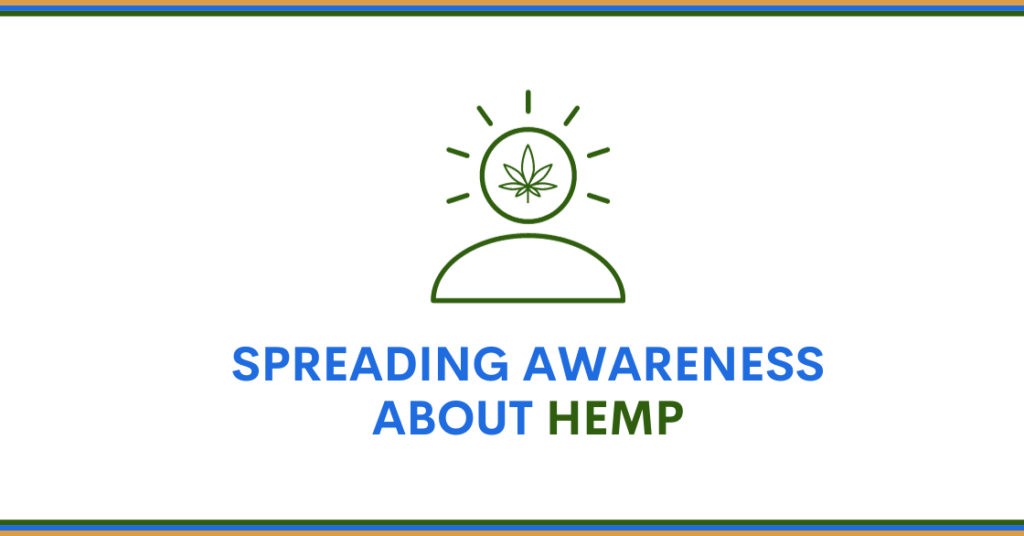
Spreading Awareness & Supporting the Hemp Industry
HempAware Radio, is a podcast hosted by Tyler Hemp, that aims to empower and educate listeners about the potential of hemp.
Tyler encourages listeners to spread awareness by requesting hemp products at local stores.
Supporting the hemp industry not only promotes sustainable practices but also contributes to its growth and development.
HempAware Radio: Empowering Listeners about the Potential of Hemp
Hemp Radio, hosted by Tyler Hemp, is a podcast dedicated to spreading awareness and educating listeners about the potential of hemp.
Hemp is a versatile and sustainable plant that has numerous applications across various industries, including textiles, medicine, construction, and more.
Through Hemp Radio, Tyler Hemp shares his knowledge and experiences with listeners, highlighting the benefits of hemp and its potential to revolutionize our economy and society.
By discussing topics such as hemp farming techniques, hemp-derived products, and the latest advancements in hemp research, Tyler aims to empower listeners with the information they need to become advocates for the hemp industry.
Spreading Awareness: Requesting Hemp Products at Local Stores
One of the key ways to support the hemp industry is by spreading awareness and encouraging the availability of hemp products at local stores.
By requesting hemp products, you are showing your support for sustainable practices and helping to create a demand for these eco-friendly alternatives.
When you visit your local stores, whether it’s a grocery store, clothing boutique, or health and wellness shop, take a moment to talk to the staff and request hemp-based products.
Explain the benefits of hemp, such as its durability, breathability, and its potential to reduce reliance on harmful materials like plastics and synthetic fabrics.
Additionally, you can also utilize social media platforms to raise awareness about the benefits of hemp and encourage others to request hemp products at their local stores.
By sharing your own experiences and educating your network, you can inspire others to join the movement and support the hemp industry.
Promoting Sustainability and Growth with Hemp
Supporting the hemp industry goes beyond just spreading awareness.
It is also about promoting sustainable practices and contributing to its growth and development.
By choosing hemp products, you are making an eco-conscious decision that benefits both the environment and the economy.
Hemp is a highly sustainable crop that requires minimal water and pesticides to grow. It also has the ability to absorb carbon dioxide and regenerate soil, making it beneficial for the overall health of our planet.
When you support the hemp industry, you are indirectly supporting sustainable farming practices and contributing to the reduction of greenhouse gas emissions.
Furthermore, supporting the growth and development of the hemp industry creates job opportunities and boosts local economies.
As the demand for hemp products increases, more companies will invest in hemp cultivation, processing, and manufacturing.
This creates a ripple effect, stimulating economic growth and providing employment opportunities for individuals in various sectors.
The Conclusion of Hemp Making a more Prosperous World
In conclusion, HempAware Radio, hosted by Tyler Hemp, is a powerful tool for spreading awareness and empowering listeners about the potential of hemp.
By requesting hemp products at local stores and supporting the hemp industry, we can promote sustainable practices, contribute to its growth and development, and create a more eco-friendly and economically prosperous future.
So, join the movement and be a part of the hemp revolution!

